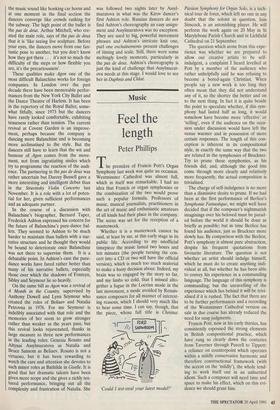Music
Feel the length
Peter Phillips
The premiere of Francis Pott's Organ Symphony last week was quite an occasion. Westminster Cathedral was almost full, which in itself was remarkable. I had no idea that Francis or organ symphonies or the combination of the two would prove such a popular formula. Professors of music, musical journalists, practitioners in the art of music and enthusiastic amateurs of all kinds had their place in the company. The scene was set for the reception of a masterwork.
Whether it is a masterwork cannot be said, at least by me, at this early stage in its public life. According to my unofficial timepiece the music lasted two hours and ten minutes (the people turning the con- cert into a CD or two will have the official version), which is much too much material to make a hasty decision about. Indeed, my brain was so engaged by the story so far, and my limbs so cold, that I missed alto- gether a fugue in the Locrian mode in the last movement, a mode avoided by Renais- sance composers for all manner of interest- ing reasons, which I should very much like to hear some time. I can say, though, that the piece, whose full title is Christus: `Could I test-steal your latest model?' Passion Symphony for Organ Solo, is a tech- nical tour de force, which left no one in any doubt that the soloist in question, lain Simcock, is an astonishing player. He will perform the work again on 20 May in St Marylebone Parish Church and in Lichfield Cathedral on 21 September.
The question which arose from this expe- rience was whether we are prepared to allow our creative artists to be self- indulgent, a complaint I heard levelled at Pott by a member of the audience who rather unhelpfully said he was refusing to become a bored-again Christian. When people say a new work is too long they often mean that they did not understand any of it, so the shorter the better and on to the next thing. In fact it is quite beside the point to speculate whether, if this sym- phony had lasted half as long, it would somehow have become more 'effective' or `telling', even if the audience on the occa- sion under discussion would have left the venue warmer and in possession of more certain responses. The length of this con- ception is inherent in its compositional style, in exactly the same way that the two are related in the symphonies of Bruckner. Try to prune these symphonies, as his friends did, and, although the good bits come through more clearly and relatively more frequently, the actual composition is trivialised.
The charge of self-indulgence is no more than a dismissive desire to prune. If we had been at the first performance of Berlioz's Symphonie Fantastique, we might well have decided that if the composer's nightmarish imaginings over his beloved must be parad- ed before the world it should be done as briefly as possible; but in time Berlioz has found his audience, just as Bruckner more slowly has. By comparison with the Berlioz, Pott's symphony is almost pure abstraction, despite his frequent quotations from favourite literature. The question is not whether an artist should indulge himself, which he must do to create anything indi- vidual at all, but whether he has been able to convey his experience in a commanding language. The language of this symphony is commanding; but the unravelling of the experience which lies behind it will be trivi- alised if it is rushed. The fact that there are to be further performances and a recording of the Westminster Cathedral version on sale in due course has already reduced the need for snap judgments.
Francis Pott, now in his early thirties, has consistently espoused the strong elements in British compositional practice, which have rung so clearly down the centuries from Taverner through Purcell to Tippett: a reliance on counterpoint which operates within a mildly conservative harmonic and therefore constructional framework (with the accent on the 'mildly), the whole tend- ing to work itself out in an unhurried idiom. Such a composer will need time and space to make his effect, which on this evi- dence we should grant him.


























































 Previous page
Previous page